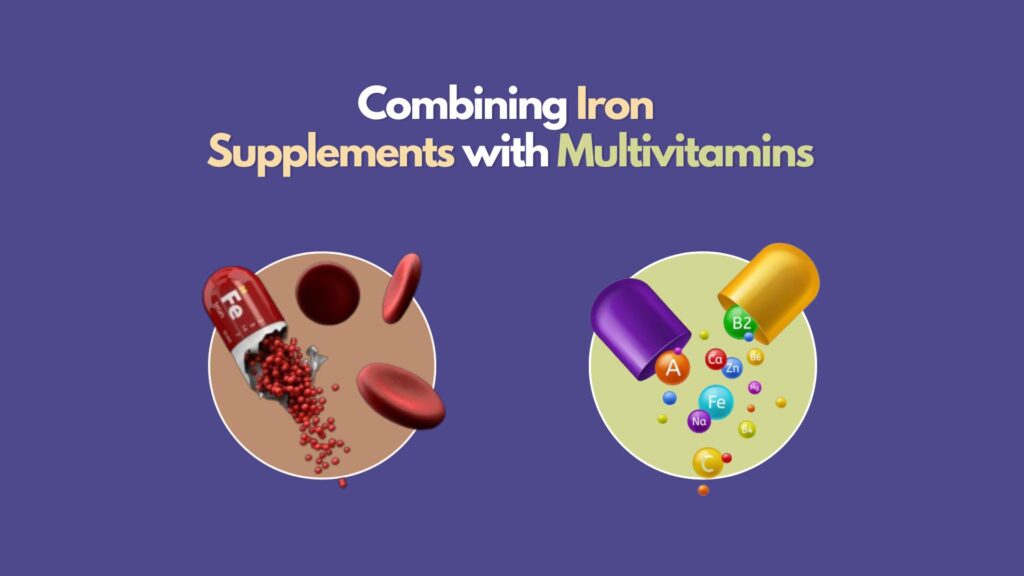
Mukta
Bariatric Dietician & Content Writer
Why Combining Iron Supplements with Multivitamins Might Not Be the Best Idea

In the quest for optimal health, many individuals turn to multivitamin supplements to ensure they meet their daily nutritional needs. Simultaneously, iron supplements are often recommended for those facing deficiencies or at risk of anemia. While both serve essential roles in maintaining well-being, combining iron supplements with multivitamins may not always be the best strategy. In this blog, we’ll learn the potential pitfalls of this common practice and why careful consideration is crucial for your health.
Understanding the Roles of Iron and Multivitamins
Before delving into the reasons to exercise caution when combining iron supplements with multivitamins, it’s important to grasp the distinct roles these nutrients play in the body.
Iron: An essential mineral, iron is integral to the formation of hemoglobin, the protein in red blood cells responsible for transporting oxygen. Iron deficiency can lead to anemia, causing fatigue, weakness, and other related issues.
- Multivitamins: These supplements typically contain a variety of vitamins and minerals, including but not limited to vitamins A, C, D, E, and various B vitamins, as well as minerals like calcium, magnesium, and zinc. Multivitamins aim to fill nutritional gaps and support overall health.
Competing Absorption Pathways
One of the primary concerns when combining iron supplements with multivitamins lies in the absorption pathways these nutrients share. Iron absorption is influenced by several factors, including dietary sources, absorption enhancers, and inhibitors.
Calcium and Zinc: Many multivitamins contain calcium and zinc, both of which can hinder the absorption of non-heme iron—the type found in plant-based foods and supplements. Consuming these minerals alongside iron may reduce the effectiveness of iron absorption.
Vitamin C: On the other hand, vitamin C enhances non-heme iron absorption. While this might seem beneficial, the challenge arises when iron supplements are taken with multivitamins that contain both calcium or zinc and vitamin C. These conflicting factors can create a nutritional tug-of-war in the digestive system.
Potential Side Effects and Gastrointestinal Distress
Combining iron supplements with multivitamins can lead to an increased risk of side effects and gastrointestinal discomfort. Iron supplements are notorious for causing constipation, nausea, and stomach upset in few individuals. The additional components in multivitamins, especially when taken at higher doses, may exacerbate these side effects.
Digestive Upset: Multivitamins often contain a broad spectrum of nutrients that may be challenging for the digestive system to process in a single dose. When combined with iron supplements, the likelihood of experiencing digestive upset or discomfort may rise.
- Overconsumption of Certain Nutrients: Some multivitamins may provide nutrients at levels that, when combined with dietary intake, surpass recommended daily allowances. Overconsumption of certain vitamins and minerals can have adverse effects on health.
Individualized Nutritional Needs
Nutritional requirements vary from person to person based on factors such as age, sex, health status, and dietary habits. Taking a blanket approach with multivitamins and iron supplements may lead to unnecessary nutrient overload for some individuals while potentially falling short for others.
Tailored Supplementation: It’s crucial to recognize that not everyone requires iron supplementation, and excess iron can have adverse effects. Before combining iron supplements with multivitamins, individuals should undergo thorough assessments to determine their specific nutritional needs. This personalized approach ensures that supplementation aligns with individual health goals and avoids unnecessary risks.
Potential for Toxicity
Excessive iron intake can lead to iron toxicity, a condition that can cause serious health issues. Combining iron supplements with multivitamins, especially without careful consideration of total nutrient intake, heightens the risk of surpassing recommended daily limits.
Accumulative Effects: Iron is stored in the body, and excess iron can accumulate over time. Continuous supplementation without monitoring overall nutrient intake may inadvertently lead to iron toxicity.
Health Consequences: Iron toxicity can result in symptoms such as nausea, abdominal pain, organ damage, and even life-threatening complications. This emphasizes the importance of approaching iron supplementation with caution, considering both dietary sources and other supplements in the mix.
Guidance from Healthcare Professionals
Given the potential complexities and risks associated with combining iron supplements with multivitamins, seeking guidance from healthcare professionals is paramount. A registered dietitian, nutritionist, or healthcare provider can conduct a comprehensive assessment of individual nutritional needs, identifying any deficiencies or excesses and tailoring a supplementation plan accordingly.
Monitoring Iron Levels: Regular monitoring of iron levels through blood tests is essential for those considering iron supplementation. This allows for adjustments to the dosage or discontinuation of supplementation as needed.
Individualized Recommendations: Healthcare professionals can provide personalized recommendations based on individual health status, ensuring that supplementation aligns with overall well-being and avoids potential pitfalls.
While iron supplements and multivitamins both contribute to overall health, combining them without careful consideration can lead to potential drawbacks. The competing absorption pathways, risk of side effects, potential for toxicity, and the need for individualized nutritional approaches underscore the importance of thoughtful supplementation.
Before incorporating iron supplements or multivitamins into your routine, consult with a healthcare professional to assess your specific needs. This personalized guidance ensures that your supplementation strategy aligns with your health goals, promoting optimal well-being without unnecessary risks. Remember, a balanced and informed approach to nutrition is key to unlocking the full potential of your health journey.





